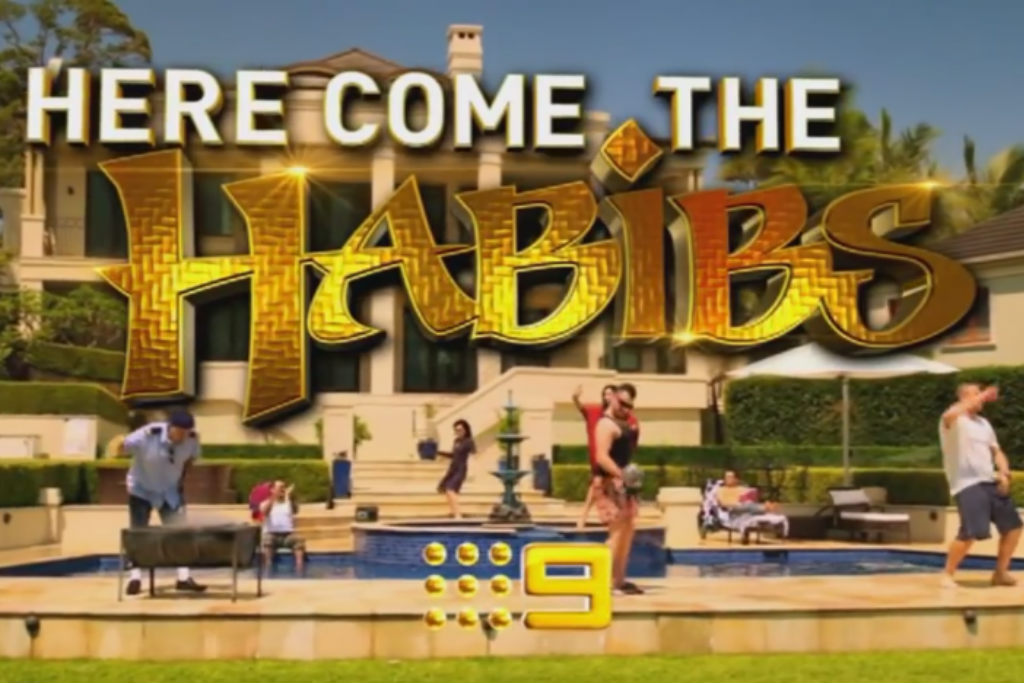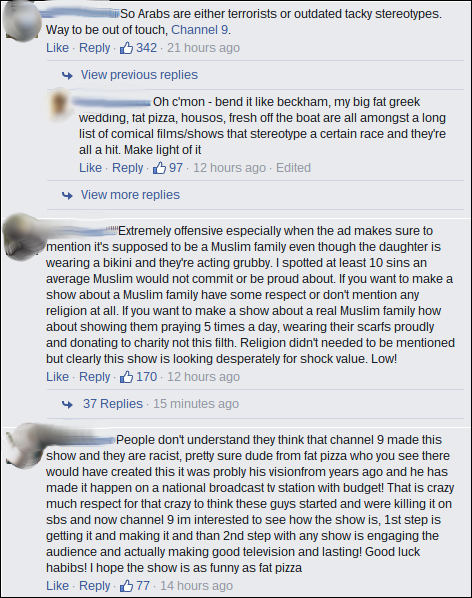The Promo For Channel Nine’s Upcoming Show ‘Here Come The Habibs’ Is Exactly What You’d Expect
Ohhhh, boy.

“Okay, promo’s almost ready to go. We’ve got the Aladdin-esque typeface; the word ‘HABIBS’ taking up half the screen; we play to every conceivable stereotype about Middle Eastern people that won’t get us a public rebuke from ASIO. I’m just worried people won’t get that this family is ethnic. Any ideas?”
“Easy, chuck that ‘ALELELELELE!’ soundbite in there again at the end, we only use it three times in the preceding 20 seconds.”
Presumably that was the conversation Channel Nine’s production crew had before putting the finishing touches on the trailer for Here Come The Habibs, a new original comedy series airing sometime this year.
According to the synopsis, HCTH is the story of a Lebanese family who move from Sydney’s west to ultra-rich, ultra-white Vaucluse after winning the lottery. Their interactions with new neighbours the O’Neills, eastern suburbs royalty who are “extremely uncomfortable with goats and chickens, shisha pipes and people of Mediterranean appearance,” form the show’s premise and comedic hook.
The six-part series promises to “bring a fresh comic perspective to multicultural Australia”, but based on the reaction the promo’s gotten so far people are fairly divided on whether it’ll be a funny, lighthearted look at serious issues in modern Australian society, or a retrograde, racist depiction of Middle Eastern people that panders to a white audience eager to laugh at ethnic stereotypes.
Going on the trailer alone, the latter scenario certainly seems more likely.
I am calling it now.. #HereComeTheHabibs = pile of shite – Not doing much for easing Stereotyping Australia. Can’t wait to see how it goes.
— christophe mallet (@cmallet) December 24, 2015
#HereComeTheHabibs OMG IM SO WATCHING I BET THEY ARE BULLDOG SUPPORTERS HILARIOUS
— Joanna Lansdowne⚡️ (@deansgaljo) December 24, 2015
Let’s play “Free to Air Show or UPF slogan”. First up; “Here Come The Habibs”
— Tom Bell (@TomRBlike) December 28, 2015
HctH comes from the mind of actor and comedian Rob Shehadie — best known for playing Rocky in SBS’ long-running Fat Pizza franchise and for creating the independent theatre production Lebanon with Love — and fellow Pizza alum Tahir Bilgic. Pizza became a cult hit for SBS, both lauded and fiercely criticised for its depiction of multicultural life in Sydney’s west; debates about whether creator Paul Fenech was lovably ribbing or exploiting the communities portrayed in Pizza and later shows like Housos raged at the time, especially given his over-the-top, slapstick style of comedy that ran with stereotypes to their most extreme limits.
Fenech prides himself on diving head-first into topics more ‘respectable’ establishment artists are too squeamish to touch — racial tensions in low-income communities, poverty on the fringes of Australia’s major cities, corrupt and bullying behaviour by police — and arguing that the worlds he depicts in his comedy represent the ‘real’ Australia. He also loves courting controversy and exposing what he sees as the hypocrisy of middle-class snobbery; he infamously won short film festival Tropfest in 1998 under a female pseudonym, playing to festival director John Polson’s keenness to award the grand prize to a woman.
Whether Here Come The Habibs walks the same line as the show that inspired it remains to be seen; being on a commercial network, one would have to assume the more cartoonish displays of sexism and racial stereotyping Pizza became famous for will be smoothed out of the series, if not the promo. There’s a delicious hint of taking the piss when Habib patriarch Fou Fou laments that they have “the neighbours from hell” in the uber-posh O’Neills — a catchphrase made famous by shows like A Current Affair that, in real life, is always directed at the Habibs of the world.

The show itself might prove to be substantive where the trailer is shallow, nuanced where the trailer is exploitative — that was the consensus around SBS’ controversial Struggle Street, a raw and heartfelt exploration of outer suburban poverty that made headlines for cutting a trailer featuring a man farting on his front verandah.
Or it could veer into Jonah from Tonga territory: thoughtlessly playing up stereotypes for cheap laughs, content to pander to its audience’s prejudices without any attempt at holding a mirror up to them. The uber-WASPy O’Neills are sold as being the brunt of most of the show’s jokes, but going off the trailer it’s clearly the Habibs who are figures of fun.
Of course, Here Come The Habibs could end up somewhere in between — people are very good at seeing what they want to see in creative works, and conveniently ignoring the rest. Any upper-middle class white kid happily rapping along to Kanye West, N-words and all, is proof of that.
Who knows! Maybe Here Come The Habibs will be a surprisingly thoughtful, biting take on race and multicultural coexistence in suburban Australia that we’ll be talking about fondly in ten years. But if Channel Nine are hoping to spearhead some new conversations on race and multiculturalism in Australia, they might want to think twice about their promotions strategy first.